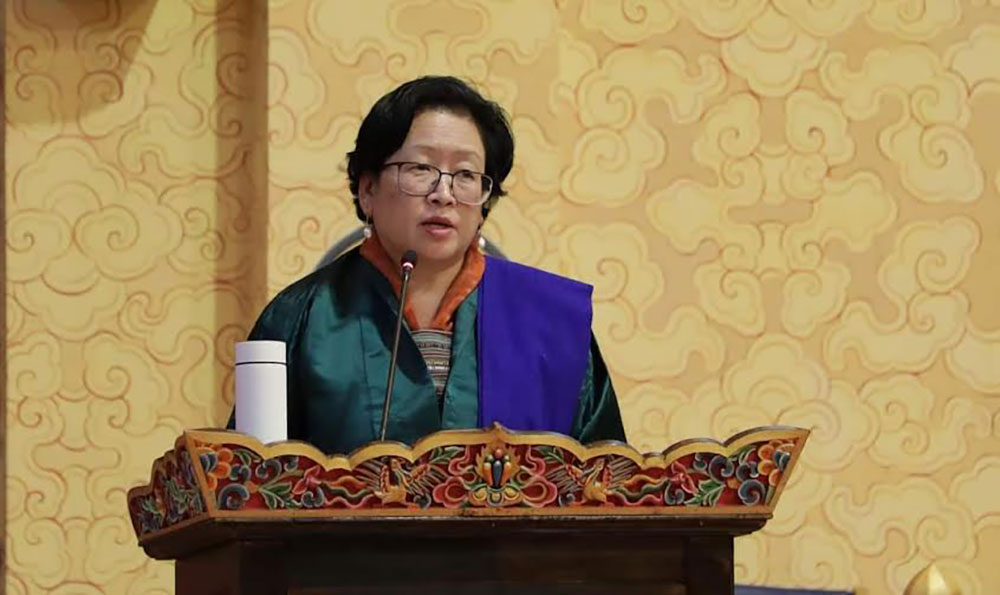NC’s Social and Cultural Affairs Committee calls for inclusive support for Media
Thinley Namgay
The National Council’s (NC) Social and Cultural Affairs Committee (SCAC) recommended formalising the Bhutan Broadcasting Service (BBS) as a Public Service Broadcaster to ensure its independence and ability to fulfill its public service mandate.
The recommendation was part of a Review Report on the State of Media presented by the SCAC at the NC yesterday. The Chairperson of SCAC, Eminent Member Kesang Chuki Dorjee, presented the report.
The Committee called for the development of a strategic roadmap to enhance the media’s role in Bhutan. The roadmap would include conducting regular media development assessments, implementing circulation audits, and enforcing stricter Standard Operating Procedures for information sharing.
The Committee also recommended an urgent review and amendment of existing legislation to address the challenges posed by digital transformation. This includes revising the Copyright Act (2001), the Industrial Property Act (2001), and particularly the Info Communications Media Act (2018).
Other recommendations include drafting and adopting a National Information and Digital Policy, establishing a fair advertisement policy, creating a venture capital framework and payment gateway for the digital economy, and offering incentives and technical support for newspapers to publish in Dzongkha.
The SCAC conducted 19 stakeholder consultation meetings with media houses and relevant stakeholders in October this year.
The House supported only a few recommendations proposed by the committee, instructing the SCAC to revisit disputed provisions and present the final recommendations on December 5.
NC Member from Haa, Dago Tsheringla, said BBS TV coverage is only 70 percent, which needs improvement. He also expressed concerns over the dwindling number of Dzongkha newspapers.
Wangdue NC Member Phub Dorji emphasised that while the media is crucial for the country, society has yet to benefit fully from it due to a lack of investment.
He said that people are still not aware of responsible social media usage and that media houses face the challenge of balancing profit-making and public service.
Bumthang NC Member Kencho Tshering stressed the importance of a Right to Information (RTI) Act.
State of media
Beside BBS TV, Bhutan currently has seven newspapers, four radio stations, and three over-the-top (OTT) platforms. Additionally, social media usage in the country is extensive
The SCAC report also noted Bhutan’s significant decline in the World Press Freedom Index, from 33rd place in 2021 to 147th place in 2023. This decline reflects the political, legal, economic, and sociocultural challenges faced by Bhutanese media.
However, the SCAC report indicated that many journalists do not believe in this ranking set by the Reporters Without Borders.
The SCAC chairperson highlighted the challenges faced by media houses, including financial instability, outdated regulatory frameworks, limited access to information, and inadequate support for media professionals. A common challenge for journalists is the difficulty of obtaining information, low salaries, and minimal training opportunities.
Between 2021 and 2023, more than 60 percent of senior journalists left the profession, leading to an influx of younger and relatively inexperienced journalists. Currently, the average age of journalists in Bhutan is 34 years, with 25 percent having less than one year of experience, and 44 percent being female.
Most journalists leave their positions within three years, and media organisations face attrition rates exceeding 50 percent, negatively affecting their credibility and standards.
Struggling media houses
BBS, as the largest media organisation in the country, has faced several challenges over the years.
A 2019 internal evaluation found issues such as the lack of an effective news management system, inadequate editorial policies, and a shortage of experienced reporters and editors.
High staff turnover has worsened these issues, with many experienced professionals leaving BBS for better career opportunities. In 2022, 87 professionals left, followed by 19 in 2023 and 15 more this year.
According to the Bhutan Media Foundation (BMF), there is one newspaper for every 111,032 Bhutanese, but the market can realistically support only three newspapers.
Kuensel, Bhutan’s largest newspaper, is 49 percent privately owned, with mounting pressure to increase profits. Challenges include reduced circulation, declining ad revenue, and competition from emerging media firms.
Kuensel also faces restrictions in seeking grants and applying for economic stimulus plans. Sustaining Dzongkha content is also challenging due to low demand and limited advertisement.
Meanwhile, private newspapers rely heavily on government funding, with about 90 percent of their income derived from it. On top of low salaries, some journalists in private media houses are paid late.
The government supports private media through fiscal incentives, such as tax relief and an annual grant of nearly Nu 700,000 from the Media Enterprise Development Budget.
Radio stations face issues such as small advertising markets, evolving technological preferences, and lack of funding for digital upgrades. The OTT platforms struggle with outdated regulations, inconsistent implementation, and limited access to funding.
About 90 percent of Bhutanese are active on at least one social media platform, spending an average of 163 minutes daily. Issues include cyberbullying, scams, fake news, defamation, and digital addiction.
Bhutan also lacks a National Digital Media Literacy Policy and a clear regulatory mechanism for digital platforms.


